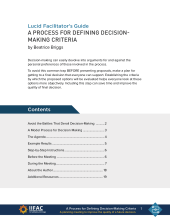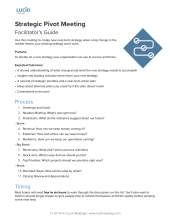Category: Catalyst Meetings
You can find an introduction to the Catalyst Meetings in Chapter 22 of Where the Action Is.
Catalyst meetings are scheduled as needed, and include the people the organizers feel to be best suited for achieving the meeting goals. That could be an established team, like it is with product Planning or marketing Planning meetings, or the group could be a surprise, like it is with a community outreach Workshop.
Meeting Agenda Templates and Guides
How to Establish Decision-Making Criteria with a GroupBeatrice Briggs - This meeting agenda template helps teams clarify the scope of an upcoming decision, the information they'll need to gather about each option they consider, and the criteria they'll use to evaluate these option. Use this template as a guide to help you prepare for and lead this meeting. |
|
How to Run a Strategic Pivot MeetingElise Keith - Purpose:To decide on a new strategy your organization can use to survive and thriveExpected Outcomes:A shared understanding of what changed and what the new strategy needs to accomplishInsights into leading indicators that inform your new strategyA new list of strategic priorities and a near-term action planIdeas... [ more ] |
Glossary of Meeting Terms
General Term
What value do your meetings create?
When you improve the productivity of your meetings, you ensure your team can answer that question.
You can capture that value by asking for their BLUF: Bottom Line Up Front.
A BLUF...

